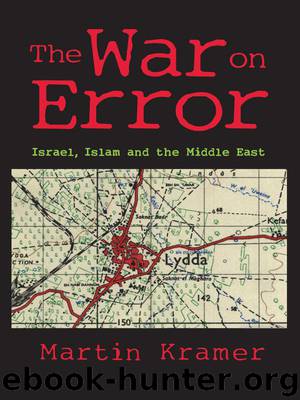The War on Error: Israel, Islam, and the Middle East by Kramer Martin

Author:Kramer, Martin [Kramer, Martin]
Language: eng
Format: azw3, epub
Publisher: Transaction Publishers
Published: 2016-10-31T04:00:00+00:00
So in none of these meetings was there a preliminary half-hour lecture on Palestine. In most of them, the threat posed by Iran loomed larger than any anxiety over the absence of an Israeli-Palestinian agreement. Looking back at these meetings in 2008, Hagel claimed that “the people of the Middle East themselves tell me that this issue has to be dealt with or there will not be a resolution to any other issue in the Middle East.” In none of these meetings did any Arab leader tell Hagel any such thing.
Hagel didn’t just claim to get the linkage message from Arab leaders. “You listen to Jewish leaders, and you listen to Arab leaders.” (By “Jewish,” he must have meant Israeli.) Hagel met many Israelis, and only he and they know what they told him. But on at least one occasion, he heard one of them brusquely dismiss the “linkage” argument. Hagel (and Senator Biden) met with then-prime minister Ariel Sharon in December 2004, and one of the Americans in the delegation (unnamed in the dispatch) had the temerity to suggest that “progress towards Israeli-Palestinian peace would have a dramatic impact on ending regional and international terrorism. Sharon quickly stated that Israel should not be held responsible for terrorism, asserting that it was the target of terror even prior to June 1967. It was not correct to believe that terror would disappear if the Israeli-Palestinian dispute were solved. The only thing that Israel was ‘responsible’ for, he maintained, was defending its people.”20 If “Jewish leaders” told Hagel anything that reinforced his thesis, Ariel Sharon definitely was not among them.
Neither was his successor, Ehud Olmert, who told Hagel (and several other senators) in May 2007 that Arab fear of Iran had created a situation where, “for the first time, we are not enemy number one.”21 On that same visit, then-foreign minister Tzipi Livni told the senatorial delegation that “there was a new understanding in the region that the Iranian threat is an ‘existential’ one and has become more significant than the Israeli-Palestinian conflict.”22
Download
The War on Error: Israel, Islam, and the Middle East by Kramer Martin.epub
This site does not store any files on its server. We only index and link to content provided by other sites. Please contact the content providers to delete copyright contents if any and email us, we'll remove relevant links or contents immediately.
| Anthropology | Archaeology |
| Philosophy | Politics & Government |
| Social Sciences | Sociology |
| Women's Studies |
The Secret History by Donna Tartt(19047)
The Social Justice Warrior Handbook by Lisa De Pasquale(12187)
Thirteen Reasons Why by Jay Asher(8892)
This Is How You Lose Her by Junot Diaz(6877)
Weapons of Math Destruction by Cathy O'Neil(6264)
Zero to One by Peter Thiel(5786)
Beartown by Fredrik Backman(5737)
The Myth of the Strong Leader by Archie Brown(5496)
The Fire Next Time by James Baldwin(5431)
How Democracies Die by Steven Levitsky & Daniel Ziblatt(5213)
Promise Me, Dad by Joe Biden(5141)
Stone's Rules by Roger Stone(5081)
A Higher Loyalty: Truth, Lies, and Leadership by James Comey(4950)
100 Deadly Skills by Clint Emerson(4919)
Rise and Kill First by Ronen Bergman(4778)
Secrecy World by Jake Bernstein(4740)
The David Icke Guide to the Global Conspiracy (and how to end it) by David Icke(4699)
The Farm by Tom Rob Smith(4502)
The Doomsday Machine by Daniel Ellsberg(4484)
